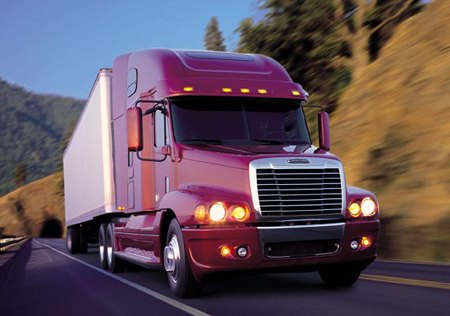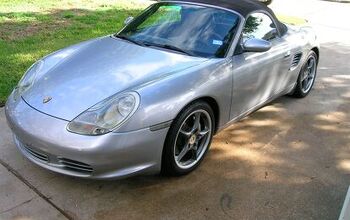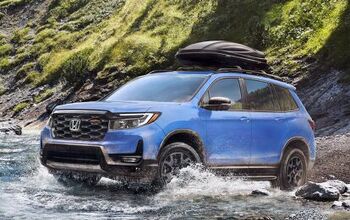The Mitsubishi Freightliner
Mitsubishi Motors is on the ropes. US sales are in the basement. Aside from the new Eclipse and the niche-market EVO, they haven't got a winning product in sight. A line of forgettable sedans and me-too SUVs does not a viable car company make. DaimlerChrysler's decision to pull the plug on future financial aid doesn't bode well either. In fact, Mitsubishi is knocking on the door of bankruptcy. Desperate times call for desperate measures. It's time for them to build a "real" pickup truck: a Mitsubishi Freightliner.
Despite the recent surge in gas prices, the US pickup truck market remains relatively robust. And even if it's contracting slightly, the profits aren't. The average profit on a pickup is $13,000 per unit. No wonder Nissan threw their hat in the ring with the Titan, and Toyota's promising all-new Tundra is due out next spring. Mitsubishi's entry, the Raider, is a badge engineered Dodge Dakota, but not nearly as memorable. It has some of the right stuff, including a V8, but cowers in the darkest corners of the marketplace, ignored and little missed. To make the grade and mint some money, Mitsubishi needs a full-size competitor to the Ford Super Duty.
Despite its connection to DaimlerChrysler, Freightliner isn't doing so well. Demand for their medium and heavy trucks has been soft for some time. Their foray into vans, the re-badged Mercedes Sprinter, is aimed at a narrow market niche– a niche that's even narrower now that there's a Dodge-badged Sprinter. But Freightliner's reputation as a maker of tough trucks is undiminished. Their Century Class trucks set new standards for comfort and luxury in heavy truck cabs. Freightliner's Sterling (formerly Ford) trucks are probably the most efficient and durable medium and heavy trucks on the planet.
Mitsubishi and Freightliner should pool their resources and build a new, heavy-duty, full-size pickup truck, designed to compete head-to-head with Ford's Super Duty. Freightliner has the design and engineering capabilities to create the truck. The Mitsubishi version could be sized and optioned like a Ford F250HD and F350, and the Freightliner version could cover the F350 and F450 range. Make sure it's big enough, has all the truck amenities and a really aggressive front end, and buyers will flock to the showrooms. A real Freightliner for the price of Dodge imitation? Hard to resist.
Freightliner doesn't make engines, and Mitsubishi doesn't have an engine suitable for a large truck. As we've discussed here before, there are plenty of first-rate American parts makers who can feed aspiring automakers suitable components. Freightliner is a major customer of Cummins. The new Mitsubishi Freightliner could run on the same Cummins diesel engine used in the Dodge Ram. Alternatively, Navistar (International) has developed a new 4.5-liter V6 diesel for Ford's F250– that The Blue Oval abandoned. Navistar has the engine and the plants to build it, but no customers.
"All Diesel, All the Time" would be a great marketing slogan. Mitsubishi could be the only company with a line of all-diesel trucks. A buyer could get a truck capable of F350 performance with the gas mileage of a gasoline powered F150 and the ruggedness of a Freightliner (at no extra charge). A tie-in with the bio-diesel business could make buyers feel good about driving a huge pickup truck, and wrest the green crown from Toyota. (Tundra pickups belch greenhouse gasses in a big way.)
Freightliner and Mitsubishi each have a suitable marketing channel for the truck. Freightliner could offer the product to fleet buyers who need a pickup to complement their semis and/or delivery trucks. Buyers could have the truck financed and serviced by the truck professionals at any Freightliner outlet, where employees know the commercial truck business inside out. No more hanging out at the Ford dealer waiting for mechanics to finish changing the oil on a minivan before getting to your work truck. Freightliner could also market a truck chassis in this class to motor home and ambulance builders; a market that's currently locked-up by Ford.
Obviously, Mitsubishi's distribution channel caters to the average consumer. Since most pickup trucks are sold for personal use, a Mitsubishi dealership would be a logical place to offer a Freightliner pickup truck for the masses. The presence of an attractive full-size truck would act as a halo vehicle, bringing buyers into the showroom (most for the first time) to see Mitsu's other offerings. A premium truck would also have a premium margin for both dealer and manufacturer, something both companies need desperately.
The US automotive market is in flux. Only those companies willing to consider new ways of doing business are going to survive. Will Mitsubishi and Freightliner see the next decade? That could very well depend on whether or not they realize that a problem shared is a problem halved.
More by Bob Elton
Latest Car Reviews
Read moreLatest Product Reviews
Read moreRecent Comments
- Theflyersfan I wonder how many people recalled these after watching EuroCrash. There's someone one street over that has a similar yellow one of these, and you can tell he loves that car. It was just a tough sell - too expensive, way too heavy, zero passenger space, limited cargo bed, but for a chunk of the population, looked awesome. This was always meant to be a one and done car. Hopefully some are still running 20 years from now so we have a "remember when?" moment with them.
- Lorenzo A friend bought one of these new. Six months later he traded it in for a Chrysler PT Cruiser. He already had a 1998 Corvette, so I thought he just wanted more passenger space. It turned out someone broke into the SSR and stole $1500 of tools, without even breaking the lock. He figured nobody breaks into a PT Cruiser, but he had a custom trunk lock installed.
- Jeff Not bad just oil changes and tire rotations. Most of the recalls on my Maverick have been fixed with programming. Did have to buy 1 new tire for my Maverick got a nail in the sidewall.
- Carson D Some of my friends used to drive Tacomas. They bought them new about fifteen years ago, and they kept them for at least a decade. While it is true that they replaced their Tacomas with full-sized pickups that cost a fair amount of money, I don't think they'd have been Tacoma buyers in 2008 if a well-equipped 4x4 Tacoma cost the equivalent of $65K today. Call it a theory.
- Eliyahu A fine sedan made even nicer with the turbo. Honda could take a lesson in seat comfort.


































Comments
Join the conversation
Do you have any more info or some possible pics of this truck??